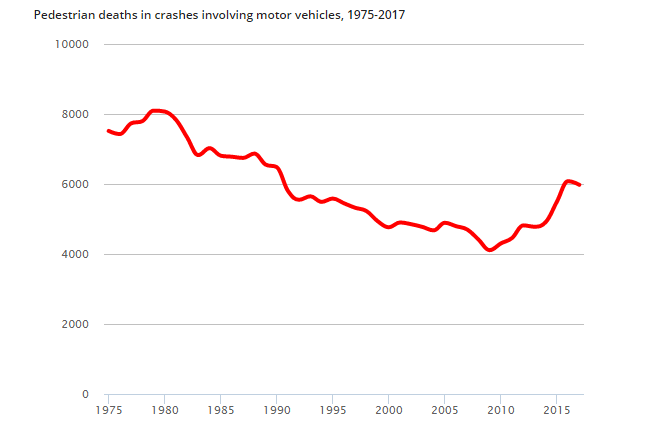BMW's Pedestrian Detection System, Frankly, Sucks
https://bvzine.com/link/bmws-pedestrian-detection-system-frankly-sucks
Cars are, by and large, getting safer. First came the addition of physical safety features, like seat belts, airbags (and then more airbags, and then even more airbags) and crumple zones. In recent years, the focus has shifted towards smarter solutions, like automatic lane control and blind spot sensors.
One group of people who haven't quite seen the benefit, though, have been pedestrians. The last decade has seen a sharp increase in the number of pedestrians killed by motor vehicles, after a consistent reduction in pedestrian road deaths over the previous 30 years.

The explanation you'll often here is that the rising death rate is linked to the increasing popularity of crossovers; whereas somebody hit by a sedan might be lifted onto the hood of the car, an impact with the sheer height of an SUV is far less survivable. Drivers don't look ready to turn their collective backs on the crossover trend just yet, though.
With a collision with the average vehicle becoming more and more dangerous, attention has understandably shifted to reducing the chances of a collision happening in the first place. Many modern vehicles now include systems that promise to detect pedestrians and take some kind of evasive action. At the very least, it's expected that the car would automatically apply the brakes before impact, reducing speed and maximizing the chances of the pedestrian surviving.
The Insurance Institute for Highway Safety (IIHS) has been vocal about championing such systems as a solution to the rise in road deaths. The organization runs regular tests demonstrating the safety features of different vehicles, with the intention of giving consumers the knowledge they need to make an informed purchase decision.
In their latest test, the IIHS took a look at the automatic emergency breaking systems in a range of small SUVs, including the 2019 BMW X1. The test used dummies to consider three scenarios: a pedestrian coming across the lane of traffic, as if crossing the street; a child pedestrian emerging from behind a parked car; and a pedestrian moving along the lane of traffic, as could happen in a rural environment or any other street without a sidewalk. And the results for the BMW X1 were... not great.
The X1 tested was fitted with BMW's Daytime Pedestrian Detection system. Here's the sales pitch:
And here's the reality:
Whereas the Toyota RAV4 and Subaru Forester were consistently able to avoid hitting the dummies at a range of speeds, the X1 had no hesitation plowing right on through every time. In fact, the X1 was the worst performing vehicle in the test, below models from, among others, Mitsubishi, Kia, Chevrolet and Nissan.
Now, the IIHS have been a little sparse on the details here. The X1 didn't avoid hitting the dummies, and hardly even applied the brakes, but it wasn't mentioned whether or not it warned the driver about the risk of collision. Without knowing that, we can't say whether this is a case of BMW's sensors failing to detect the pedestrian, or the system putting the responsibility to stop squarely on the shoulders of the driver.
The X1 also seemed to perform worse at higher speeds, not even applying minimal braking when tested at 37 mph. As the Daytime Pedestrian Detection system is designed to operate at city speeds, the failure to brake could have been intentional on BMW's part. Which makes thing better or worse, I guess.
In any case, it's not a great advert for the X1's smart safety features. With BMW recently announcing a partnership with Daimler to develop autonomous vehicles, it's starting to look like the company has a long way to go before it will be able to move control away from the driver. Which is good news for driving enthusiasts, at least.
 By
By